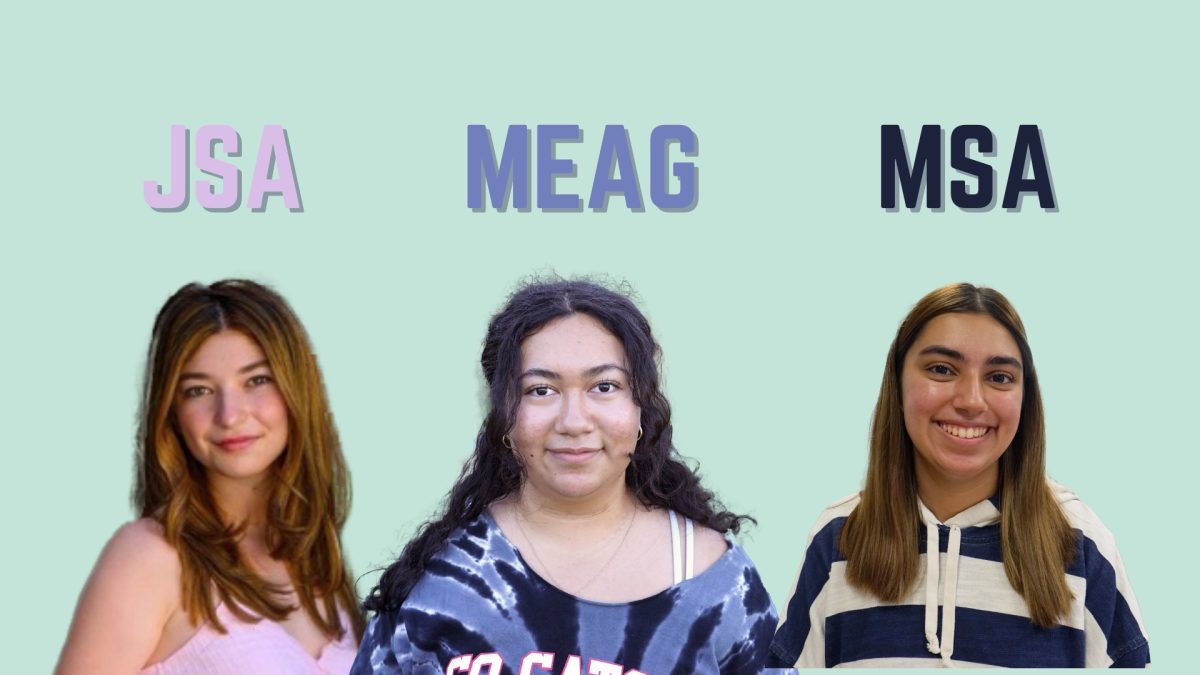In response to the current Israel-Hamas war, Upper School student leads, LITs and advisors of the Jewish Student Association (JSA), Muslim Student Association (MSA) and Middle Eastern Affinity Group (MEAG) came together in a meeting with Director of Diversity, Equity, Inclusion and Justice, Hannah Nguyễn, to discuss their feelings and hopes in approaching this event at Castilleja.
Kathy Layendecker, Acting Head of School, wrote in an all-school email on October 10, “Two messages kept coming up again and again during the conversation—violence is never the answer, and identities are complex and multifaceted.”
The purpose of this meeting was to foster more dialogue amongst each of the affinity groups and build solidarity. Despite coming from different backgrounds and experiences, the affinity groups engaged in respectful dialogue and voiced their own thoughts for the larger Castilleja community.
During the meeting, the leads acknowledged how each member of the Castilleja community, specifically the JSA, MSA and MEAG members, are in differing positions and have different connections and viewpoints related to the conflict.
In a statement sent to Counterpoint, Jillian Ascher ‘24 and Sam Solomon ‘24, co-leads of the JSA, wrote that “violence is never okay, no matter who the perpetrator is and who the recipient is.”
“There are Palestinian families grieving. There are also Israeli families grieving, and we need to make space for both,” MEAG co-lead Noor Maraqa ‘26 said.
This statement was echoed in an email sent October 13 following Laydendecker’s initial address. Nguyễn and the advisors of the JSA, MSA and MEAG wrote that “We believe in the immutable value of all human life and are heartbroken by the violence devastating communities in Israel and Gaza.” They emphasized how Castilleja stands against any form of hate and will continue to support the community in “fostering an environment where everyone feels safe, understood, and valued.”
In another email last Friday, Nguyễn and the affinity group advisors wrote how “We have received reports of comments that have caused harm to students impacted in our community by these developments.” They emphasized the importance of sitting with dissonance and understanding that “we can speak out against violence without associating the identities of its perpetrators to larger communities.”
The student leads also cautioned against the use of language and the power that comes with it. “Being Jewish doesn’t equate to being Israeli or Zionist, [and] being Muslim does not equate to being Palestinian or to supporting Hamas,” wrote Ascher and Solomon. “No matter what ‘side’ you are on, everyone can condemn the violence against innocent civilians.”
For example, extreme social media posts create more conflict and division through the spread of misinformation. Yasmine Haque ‘24, leader of the MSA, said that “it’s important to keep that nuance in there. That’s an important thing to keep in mind with any situation, any problem, [and] any conflict that arises. I feel like some of that is being lost [through social media reposting].”
MEAG co-lead Zahra Rohaninejad ‘25 expressed how “although we appreciate the solidarity and the alliance [people] want to show, making it black and white isn’t helping anyone.”
Maraqa echoed this statement through emphasizing the importance of acknowledging historical context and realizing the many layers, nuances and different experiences involved in the Israeli-Palestinian conflict. “Having continued conversations where we can talk about the historical context [and] the things that have led up to this would really improve everyone’s ability to consume the current media critically and with the lens of knowing that a lot of the time the media does not report the whole story,” she said.
As Nguyễn stated, it is critical for the Castilleja community to approach discussions with an open mind and “question why certain perspectives might be missing from the conversation.”
Rohaninejad expressed her hopes for Castilleja’s engagement in informed discourse that acknowledges and equally validates all perspectives with respect. She said that the best way to approach this difficult event is to be tolerant, value multiple perspectives and become more knowledgeable about the complexity of the Israeli-Palestinian conflict. “This doesn’t necessarily mean that we have to make everyone think the same way. It’s more that whatever our opinions are, we have to come together as a community and build solidarity,” she said.


